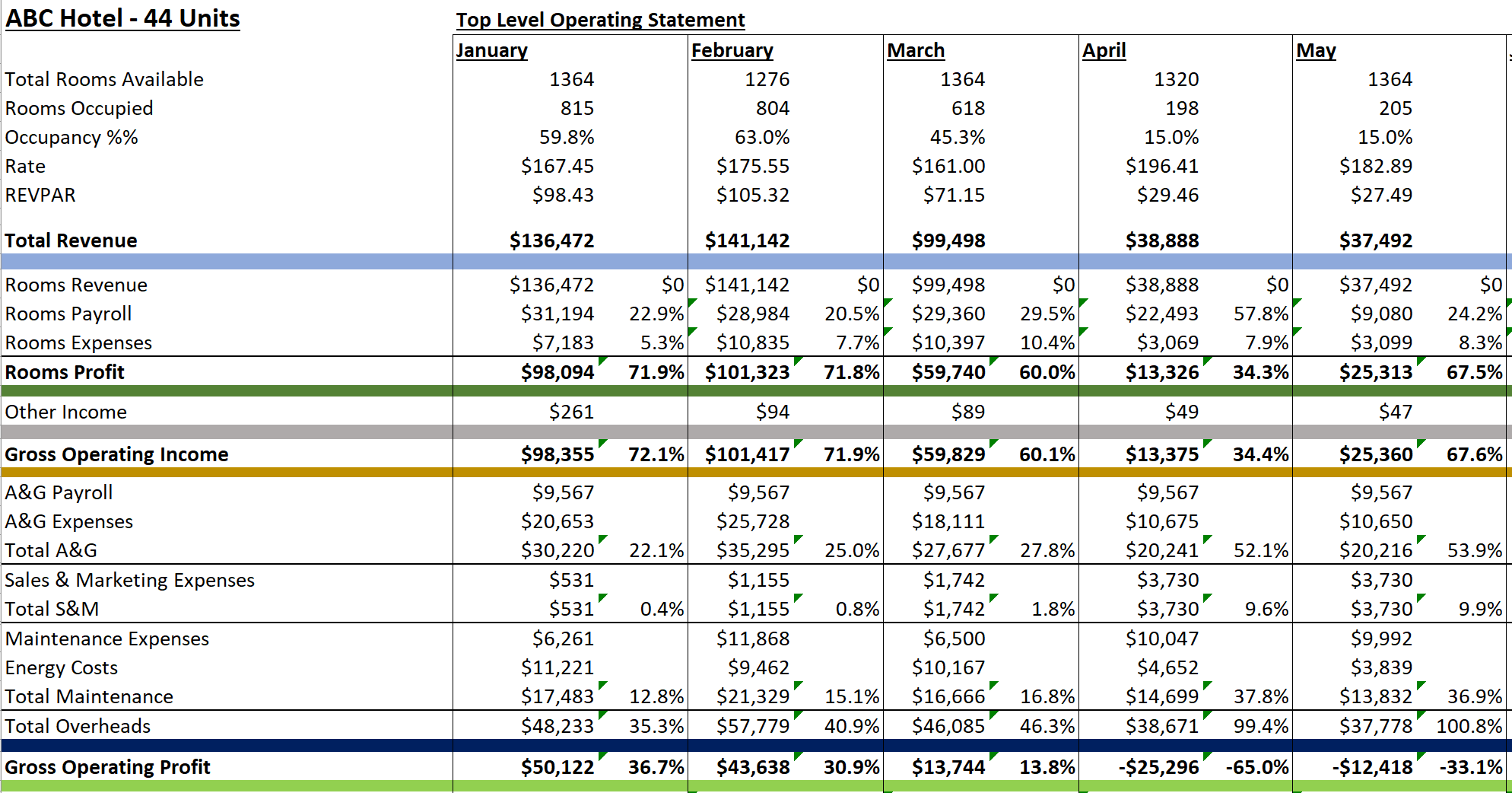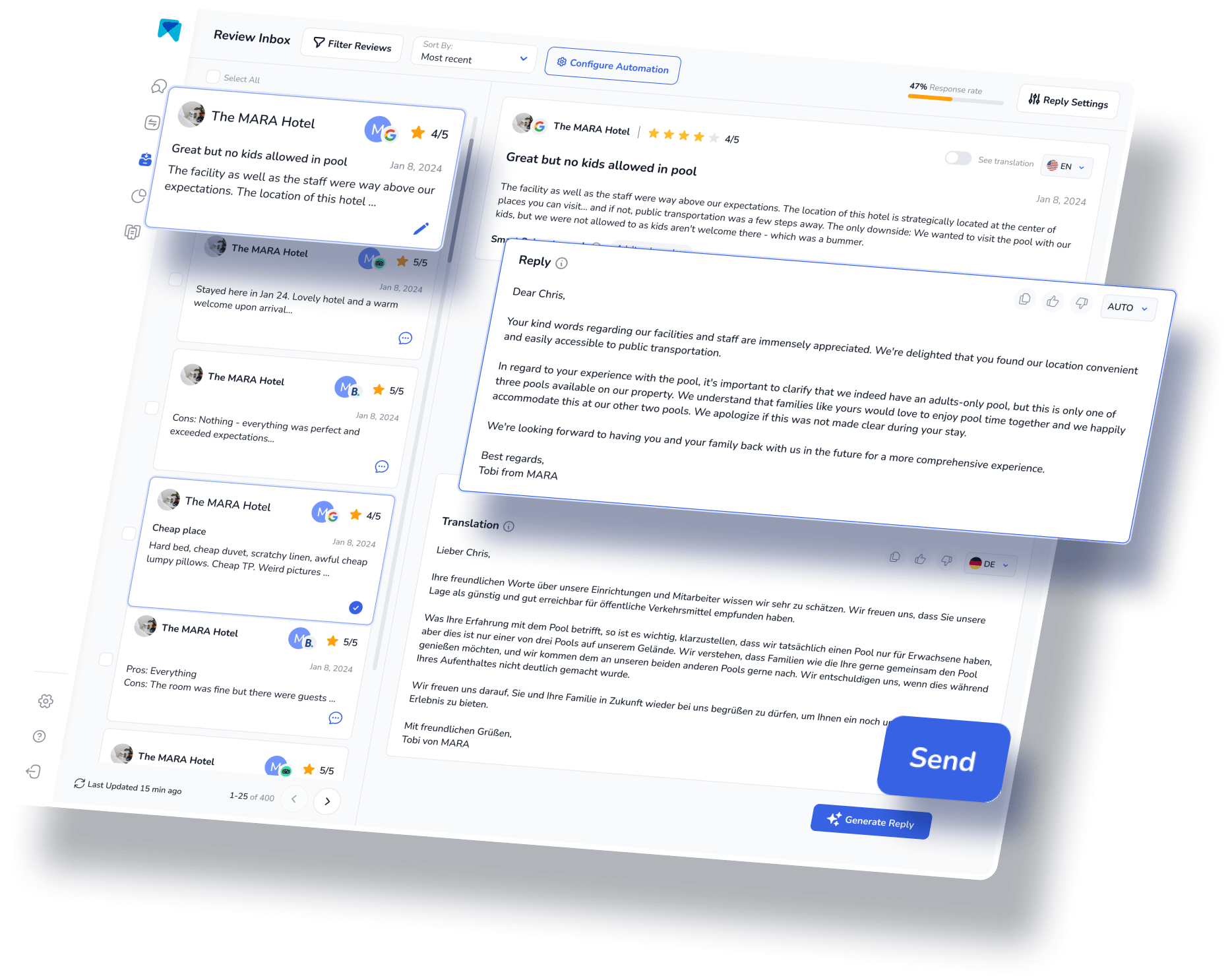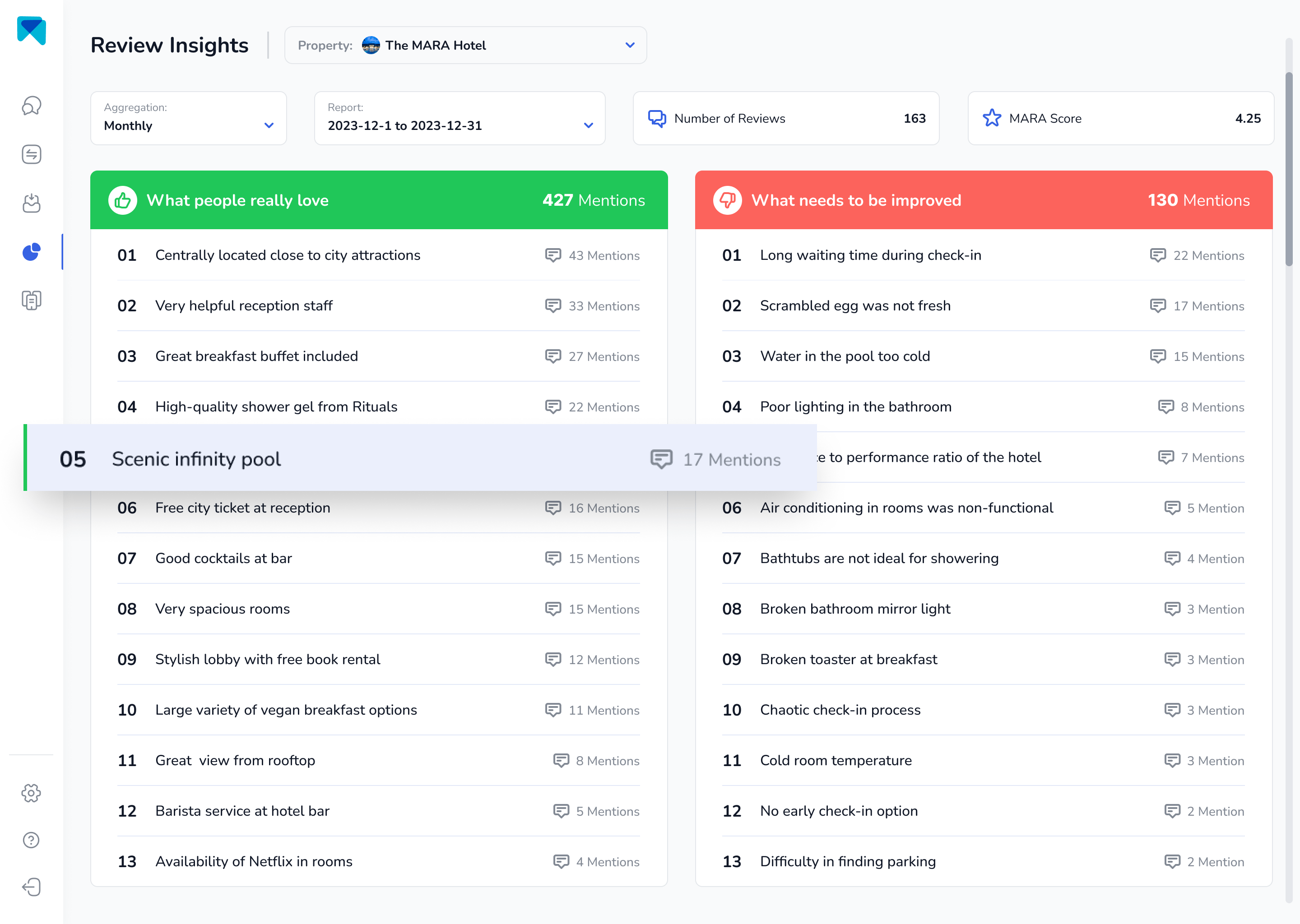Creating a solid hotel budget is crucial for small hotels to stay competitive. A well-planned budget helps hoteliers manage revenue and expenses, focusing on occupancy rates, variable costs, and capital expenditures. With accurate forecasting, hoteliers can allocate resources effectively and optimize pricing to support revenue management.
In this blog, we’ll walk you through the steps of creating a hotel budget for small hotels. We’ll cover the budgeting process, how to forecast revenue, allocate resources, and plan for both variable costs and capital expenditures to drive profitability and growth.
What is a hotel budget?
A hotel budget is a financial plan that outlines expected revenue and expenses, helping hoteliers allocate resources strategically to meet financial goals. It includes forecasting income from various revenue streams such as room bookings, food and beverage sales, and other services, while also predicting operational costs like salaries, utilities, and maintenance.

By analyzing fixed and variable costs, the budgeting process helps manage operating expenses, optimize profitability, and ensure long-term sustainability. The growth of the hotel accounting software market, valued at USD 4.5 billion in 2022 and projected to reach USD 9.7 billion by 2030, reflects the increasing importance of effective budgeting and financial management tools for hoteliers.
Budget plans are greatly determined by hotel classifications. To learn more about them, read Different Types of Hotels: A Quick Overview
What is hotel budget forecasting?
Hotel budget forecasting is the process of predicting future revenue and expenses to help hoteliers make informed financial decisions. By using historical data, market trends, and dynamic pricing strategies, hoteliers can forecast occupancy rates, average daily rate (ADR), and revenue per available room (RevPAR). This forecasting allows hotels to adjust their budgeting and resource allocation, ensuring revenue streams are optimized and costs are controlled. Forecasting supports effective revenue management and capital expenditures planning, helping hoteliers balance income and expenses while anticipating market changes.
What are the 3 types of budgets in the hotel industry?
Here are the three main types of budgets in the hotel industry, each playing a crucial role in effective financial planning and resource allocation.
{{blog-cta-book-demo="/features/product-updates"}}
1. Operational budget
The operational budget in the hospitality industry focuses on the day-to-day expenses required to run the hotel smoothly. This includes fixed costs such as utilities, maintenance, and salaries, as well as variable costs like food and beverage expenses. Labor costs are a significant part of the operational budget, representing around 20-25% of overall live roster costs. Proper budget planning and forecasting in this area allow hoteliers to allocate resources effectively, manage expenses, and ensure the profitability of the hotel’s core operations, including room bookings and services. A well-structured operational budget supports the hotel’s revenue management strategies, optimizing resource allocation for maximum income.

Discover how hotel organizational structures impact operations and revenue: Understanding Hotel Organizational Structures: Hierarchy and Roles
2. Capital budget
The capital budget focuses on long-term investments aimed at improving the hotel's physical assets, such as renovations, technology upgrades, and property enhancements. In the hospitality industry, capital expenditures typically represent about 28.7% of the hotel’s budget. This budget is crucial for evaluating the ROI of investments in areas like property management systems (PMS), dynamic pricing tools, and guest experience enhancements. Budgeting for capital expenses helps ensure that investments align with the hotel's strategic objectives, boosting long-term profitability and maintaining a competitive edge in the market.

3. Cash flow budget
A cash flow budget is essential for managing liquidity and ensuring the hotel can meet its short-term financial obligations. A reasonable cash flow percentage for a hotel is around 10%, covering expenses such as salaries, utilities, and maintenance. Effective cash flow management supports budgeting and forecasting by helping hoteliers predict fluctuations in income and expenses. This budget allows for a more precise allocation of resources, ensuring smooth operations even during periods of low occupancy or unexpected expenses. By closely monitoring cash flow, hoteliers can maintain financial stability and avoid liquidity issues that may impact day-to-day operations.

What are the factors to consider when making a hotel budget?
Here are the key factors to consider when creating a hotel budget to ensure financial stability and profitability.
a. Revenue streams
When creating a hotel budget, identifying all potential revenue streams is essential for accurate forecasting. Hotel budgets should account for various income sources like room sales, food and beverage revenue, spa services, event hosting, and other ancillary services.
Accurate revenue projections are critical in allocating resources and determining how much to invest in each revenue stream. Understanding these diverse sources allows hoteliers to optimize their strategies, such as dynamic pricing for room bookings, and effectively manage their budget allocation for marketing budgets and revenue management. Ensuring that each revenue source is considered and forecasted properly contributes to a strategic budgeting process.

Discover the top 7 revenue management solutions for hotels, enhancing profitability with optimized pricing and demand forecasting: 7 Best Hotel Revenue Management Systems: An In-Depth Comparison
b. Occupancy and ADR (Average Daily Rate)
Forecasting occupancy and Average Daily Rate (ADR) are vital to estimating hotel revenue and allocating the budget appropriately. Occupancy refers to the percentage of available rooms that are booked, and ADR reflects the average price for each room sold. These metrics are directly tied to hotel revenue and should be adjusted based on market trends, local events, seasonality, and competitor pricing.
By accurately predicting occupancy and ADR, hoteliers can adjust their operational costs, marketing budgets, and revenue management strategies to maximize profitability. The budgeting and forecasting process should include fluctuations in these metrics to optimize overall income and expenses.

c. Operational costs
Operational costs, including both fixed and variable expenses, form a significant part of the hotel budget. Fixed costs like salaries, utilities, and insurance remain relatively constant regardless of occupancy, while variable costs such as cleaning supplies, maintenance, and labor costs scale with guest activity and occupancy levels.
Properly understanding and forecasting these costs is essential to ensuring that the hotel operates efficiently. A clear picture of these expenses, especially in terms of staff wages, maintenance, and the cost of goods sold (COGS) in food and beverage services, allows hoteliers to make informed financial decisions, allocate resources effectively, and anticipate changes in their operating expenses.

d. Market conditions and competition
Market conditions and competitive factors play a crucial role in hotel budgeting. Keeping an eye on economic trends, local developments, and competitor pricing strategies allows hoteliers to predict changes in their financial performance. These factors influence your ability to adjust room rates, implement dynamic pricing, or modify operational costs.
Additionally, monitoring competition helps ensure that your hotel remains strategically priced and competitive within the market, balancing revenue generation with cost management. In your budgeting process, understanding the wider economic environment and competitive landscape can help you allocate resources more effectively and enhance overall profitability.

Optimize your hotel’s financial success with actionable insights and adaptive approaches: Best Hotel Pricing Strategies to Maximize Margins & Revenues
e. Unexpected costs and emergencies
Unforeseen expenses, such as emergency repairs, technology failures, or regulatory changes, are inevitable in the hospitality industry. To protect the financial stability of the hotel, a contingency fund should always be incorporated into the hotel budget. This reserve allows hoteliers to address unexpected costs without derailing the hotel's operations.

Allocating a portion of the budget to handle these emergencies ensures that you can maintain smooth operations during unforeseen circumstances. Whether it's a broken HVAC system or sudden maintenance issues, this emergency fund is crucial for managing unexpected costs while maintaining consistent revenue and preserving overall financial health.
How do you create a budget for a hotel?
Here are the key steps to effectively create a budget for your hotel, ensuring strategic allocation and financial success.
1. Gather data
Start by collecting comprehensive historical financial data, including occupancy trends, ADR (Average Daily Rate), RevPAR (Revenue per Available Room), guest feedback, and market conditions. By using your hotel’s Property Management System (PMS) and previous budget samples, you can analyze past performance and identify key revenue streams, such as room bookings and food and beverage sales. This data provides a strong foundation for your budget planning and revenue forecasting.
Discover essential tips for conducting a night audit in a small hotel.
2. Set realistic goals
Set achievable financial goals that align with your hotel’s strategic objectives. Focus on revenue targets for each department, including rooms, food and beverage, and other services. Determine profit margins, and clearly outline operating expenses such as labor costs, utilities, and maintenance. Ensuring these goals are realistic and in line with market trends allows for better budget forecasts and the potential to achieve profitability.
3. Forecast revenue
Utilize historical data and market insights to forecast revenue from various sources, including room sales, food and beverage, and additional amenities or services like spas or events. Consider factors such as seasonal fluctuations, local events, and changes in demand. By accurately predicting revenue streams, including the costs of goods sold in food and beverage, you can better allocate resources and plan for potential variations in income and expenses.
4. Allocate resources
Effectively allocate the budget to key operational areas, such as staffing, marketing budgets, technology investments, and property improvements. Using a flexible budget approach allows for adjustments based on demand levels—whether during peak or off-peak seasons. Prioritize labor costs, marketing expenditures, and investments that will enhance your hotel’s service offering while also accounting for fixed costs such as utilities and maintenance.
5. Monitor and adjust
Monitor your budget’s performance regularly by comparing actual revenue and expenses with the budgeted figures. Implement a proactive budgeting and forecasting process to identify discrepancies early and adjust accordingly. For instance, if labor costs are higher than expected or revenue from food and beverage falls short, adjust the budget to ensure financial goals are met without compromising service quality or operational efficiency.
6. Track key metrics
Track essential key performance indicators (KPIs) like ADR, RevPAR, occupancy rates, and labor costs to evaluate the financial health and ensure alignment with your hotel’s budget. Utilize your PMS to gather data and regularly review your revenue management strategy. Monitoring these KPIs will help you make informed decisions regarding dynamic pricing and necessary adjustments in operational costs.
Learn how to track essential metrics, improve operational efficiency, and enhance guest satisfaction: Master Hotel KPIs: Enhance Your Business Strategy
7. Review and communicate
Regularly review the hotel’s budget and ensure all departments are aligned with the financial targets. This will require effective communication across the hotel, from management to staff, ensuring that everyone is on the same page regarding expenses, revenue goals, and operational costs. Collaboration across teams is vital to adhering to the budget and achieving long-term profitability in the competitive hospitality industry.
Hotel budget sample: Small hotel
Here is a sample budget plan for a small hotel, illustrating key revenue streams and expense categories.
a. Revenue forecasts
- Room Revenue: $300,000 (Assuming an average daily rate of $150 and 2,000 room nights sold)
- Food and Beverage Revenue: $50,000 (Estimated based on guest demand and average spend per guest)
- Additional Services (Spa, Event Hosting): $25,000 (Based on historical data and market trends)
- Total Revenue: $375,000
b. Types of budgets
- Operational Budget: $200,000 (Includes day-to-day expenses such as staff salaries, maintenance, and utilities)
- Labor Costs: $75,000 (Includes salaries for front desk, housekeeping, and kitchen staff)
- Operating Expenses:
- Utilities: $20,000
- Maintenance: $15,000
- Cleaning Supplies: $10,000
- Marketing and Advertising: $25,000
- Insurance: $5,000
- Capital Budget: $40,000 (For property improvements and new equipment purchases)
- Cash Flow Budget: $25,000 (For unforeseen expenses and short-term liquidity)
c. Cost of goods and operating expenses
- Cost of Goods Sold (Food & Beverage): $20,000 (Assuming 40% of F&B revenue goes to the cost of goods)
- Other Operating Expenses: $90,000 (Includes administrative costs, technology, and supplies)
d. Budgeting and Forecasting
Regular reviews will ensure the hotel stays on track with its budget. Based on the forecast, the hotel aims to achieve a profit margin of around 10% ($37,500). Budgeting adjustments will be made quarterly to accommodate seasonal fluctuations and unexpected costs, ensuring financial stability.

Maximize your hotel budget with a strong online reputation: MARA AI
Maximizing your hotel budget starts with a strong online reputation, and MARA AI makes this process efficient and effective. This AI Review Assistant helps streamline responding to guest reviews, enhancing your online reputation while saving time and labor costs. By incorporating insights from guest feedback into your budgeting and forecasting, you can optimize occupancy rates, improve revenue, and adjust operational costs accordingly. Integrating reputation management into your hotel’s types of budgets—operational, capital, and cash flow—ensures financial success and long-term growth.
{{blog-cta="/features/product-updates"}}
AI-Powered Review Inbox
One of the key features of this tool is the Review Inbox. Your review inbox makes responding to reviews as simple as hitting "Generate reply" and clicking "Send". The Review Inbox connects to multiple review sources, including Google, Booking.com, and Tripadvisor, giving you a panoramic view of all your reviews. And you can even configure review response automation: Why not allow MARA to automatically respond to simple reviews, like 5-star Google reviews with no text, ensuring you never miss a review? Daily notifications about new reviews keep you updated and in control.

Simplified Review Analytics
To help you understand and analyze the multitude of reviews, the Review Assistant also incorporates Review Analytics. This provides actionable, easy-to-understand insights that are tailored exclusively to your business. With MARA, you can quickly get the gist of all your reviews without needing to read each one. The analysis is so detailed that you can find out about specific issues like "water in the pool is too cold" or "lack of vegan breakfast option”. These insights help optimize guest experience without requiring you to be a data expert.

The most personal response AI
MARA's AI isn't just about efficiency; it's about personalization too. The Brand Voice feature allows the AI to adapt to your tone, making sure your responses sound authentically you. Plus, with Smart Snippets, you can "teach" the AI how to respond to recurring praises or complaints. Your AI then incorporates this information into its responses, but always with different words, providing more personalized, relevant replies.
This review response assistant has quickly become a game-changer for over 2000 customers. Its promising capacity to elevate your overall rating, amplify response rates, glean insights from customer feedback and economize both time and money, is the reason behind its growing popularity.
In conclusion, managing online reviews need not be an overwhelming task. With the appropriate software, not only can you streamline the process, but you can also personalize your responses, and derive valuable insights from the reviews. So, why hesitate to give our AI Review Assistant, MARA, a try? It's completely free for testing, doesn't require a credit card, and can be fully operational in less than five minutes.
Final Thought
Effective hotel budget planning is essential for small hotels to ensure financial stability and profitability. By focusing on the three key types of budgets—operational, capital, and cash flow—hoteliers can make informed decisions and allocate resources efficiently. Accurate budgeting and forecasting, supported by historical data and market insights, help optimize revenue streams and control operational costs. Regular reviews and adjustments to the budget forecasts ensure that the hotel remains financially agile and competitive in the dynamic hospitality industry. With strong financial management, small hotels can maximize profitability and sustain long-term growth.
This post is part of our hero content series on "The Complete Hotel Management Guide: From Operations to Guest Experience”
Frequently Asked Questions:
To create a hotel budget, start by gathering historical data and market insights to inform your forecasting. Identify revenue streams like room bookings and food and beverage sales, then allocate resources to departments such as staffing and marketing. Use a flexible budget to adjust for changes in occupancy. Calculate fixed and variable costs, including labor and operating expenses, and track performance using a Property Management System (PMS) to update budget forecasts in real time.
The hotel budget process involves gathering data, setting financial goals, and forecasting revenue and expenses. Finance teams analyze historical data and market trends to predict key metrics like occupancy and ADR. Budget planning includes allocating resources to departments, tracking labor costs, and adjusting for unforeseen changes. A flexible budget helps hotels stay adaptable and on track with their financial objectives.
A hotel’s financial budget includes projected revenue and expenses, focusing on optimizing profitability. It covers operational, capital, and cash flow budgets. Budgeting and forecasting predict income from room bookings and other services while calculating costs like labor, utilities, and maintenance. A Property Management System (PMS) helps track expenses and ensure budget forecasts align with actual performance.

































-min.avif)
